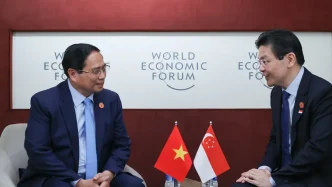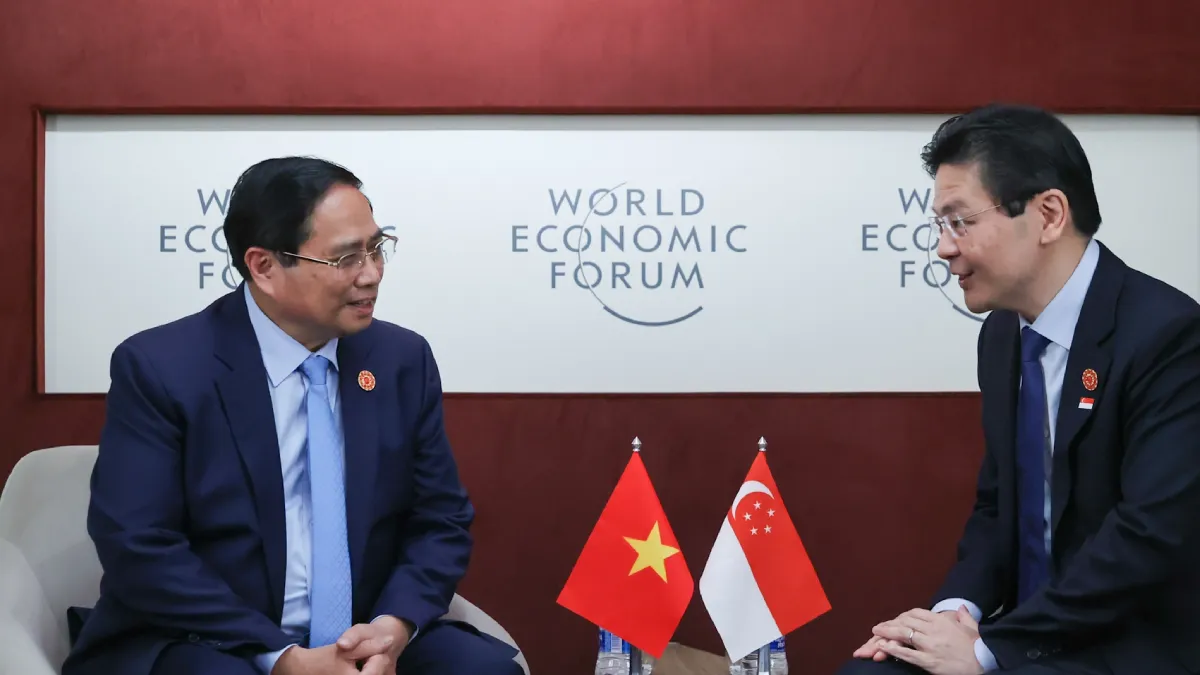In a significant step toward strengthening bilateral relations, Vietnamese Prime Minister Phạm Minh Chính and his Singaporean counterpart Lawrence Wong held high-level talks on the sidelines of the World Economic Forum (WEF) Annual Meeting of the New Champions in Tianjin, China, on June 25, 2025. The meeting underscored a shared commitment to advancing the Việt Nam–Singapore Comprehensive Strategic Partnership, with both leaders outlining ambitious plans for collaboration in emerging sectors such as the digital economy, green initiatives, and sustainable urban development.
Building on High-Level Engagements
The discussions in Tianjin come on the heels of recent high-level visits between the two nations, which have laid the groundwork for deeper cooperation. Prime Minister Chính emphasized that Vietnamese ministries and agencies are actively working to implement outcomes from these engagements. Central to this effort is the development of a detailed action plan for the 2025–2030 period, aimed at cementing the strategic partnership. This roadmap is expected to prioritize sectors that align with both countries’ long-term economic and environmental goals.
Prime Minister Wong echoed this sentiment, affirming Singapore’s readiness to finalize and sign the action plan swiftly. Both leaders expressed optimism that the partnership would not only bolster economic ties but also serve as a model for regional cooperation within ASEAN, especially at a time when geopolitical complexities demand unity and coordinated responses.
Focus on Innovation and Economic Growth
A key highlight of the talks was the emphasis on innovative sectors to drive Việt Nam’s economic growth. Prime Minister Chính called for Singapore’s support in developing the digital economy, green economy, and international financial center capabilities. These areas are seen as critical to Việt Nam’s ambition to modernize its economy and attract global investment. He proposed the expansion of Việt Nam–Singapore Industrial Parks (VSIPs), envisioning them as integrated hubs that incorporate smart urban areas and digital commerce platforms.
In response, Prime Minister Wong agreed to explore the launch of upgraded VSIPs, which would include high-tech parks and commercial zones alongside urban development projects. This move signals a shift toward more sustainable and technology-driven industrial models, aligning with global trends in smart infrastructure. The leaders also discussed enhancing training programs to build a skilled workforce in Việt Nam, with Singapore offering expertise in both short-term and long-term capacity-building initiatives.
Beyond industrial and technological collaboration, the two prime ministers identified opportunities in renewable energy, wind power exports, carbon credit exchanges, and cybersecurity. These sectors reflect a mutual recognition of the need to address climate challenges while fostering economic resilience. For Singapore, ensuring food security emerged as a priority, with Prime Minister Wong expressing a desire to strengthen cooperation with Việt Nam on rice imports—a critical component of the city-state’s strategy to safeguard its food supply amid global uncertainties.
Strengthening Bilateral and Regional Cooperation
The meeting also served as a platform to reinforce cooperation across a broad spectrum of fields. Both leaders committed to expanding Party-to-Party collaboration, a move that underscores the political trust underpinning their relationship. Economic, trade, and investment ties were identified as cornerstones of the partnership, with a particular focus on high-technology industries and sustainable urban development. Existing cooperation mechanisms will be maintained and enhanced to ensure that bilateral initiatives remain effective and adaptable to evolving challenges.
On the regional and international stage, Prime Ministers Chính and Wong exchanged views on issues of mutual concern, acknowledging the increasingly complex and unpredictable global environment. They reiterated their commitment to maintaining ASEAN unity and building a robust ASEAN Community dedicated to peace, stability, and shared prosperity. This alignment is particularly significant given the strategic importance of Southeast Asia in global geopolitics, where competing interests often test the region’s cohesion.
A Forward-Looking Partnership
The talks in Tianjin were not just about immediate outcomes but also about setting a vision for the future. Both leaders expressed confidence that with determination and concerted efforts, the Việt Nam–Singapore relationship could reach new heights. This optimism is grounded in a history of successful collaboration, including the establishment of multiple VSIPs since the 1990s, which have become symbols of economic synergy between the two nations.
Analysts view the renewed focus on digital and green economies as a strategic pivot for both countries. For Việt Nam, partnering with Singapore—a global leader in technology and finance—offers a pathway to accelerate its integration into the digital age. For Singapore, deepening ties with Việt Nam provides access to a dynamic emerging market and strengthens its role as a regional hub for innovation and sustainability.
One area of particular interest is the potential for carbon credit exchanges, which could position both nations as leaders in the fight against climate change. By leveraging Singapore’s financial expertise and Việt Nam’s vast potential for renewable energy projects, such as wind power, the partnership could yield significant environmental and economic benefits. However, experts caution that the success of these initiatives will depend on robust policy frameworks and sustained political will—factors that both governments appear committed to addressing.
Invitations and Future Engagements
As a gesture of goodwill, Prime Minister Chính extended an invitation from State President Lương Cường to the President of Singapore to attend the signing ceremony of the United Nations Convention against Cybercrime in Hà Nội in October 2025. This event highlights Việt Nam’s growing role in international cybersecurity discussions and its desire to collaborate with partners like Singapore in tackling global challenges. While it remains to be seen whether the invitation will be accepted, it underscores the deepening trust and shared priorities between the two nations.
Broader Implications for ASEAN
The outcomes of the Tianjin meeting carry implications beyond the bilateral sphere. As two influential members of ASEAN, Việt Nam and Singapore have the potential to shape the region’s approach to economic integration, technological advancement, and environmental sustainability. Their agreement to coordinate closely on maintaining ASEAN unity sends a strong message at a time when external pressures, including great power rivalries, threaten to fragment the bloc.
Moreover, the focus on food security, renewable energy, and cybersecurity reflects a broader trend within ASEAN to address non-traditional security challenges. By prioritizing these issues, Việt Nam and Singapore are contributing to a more resilient regional framework—one that can better withstand the uncertainties of the 21st century. If successful, their partnership could inspire similar collaborations among other ASEAN member states, fostering a network of innovation and mutual support.
Challenges and Opportunities Ahead
While the prospects for Việt Nam–Singapore cooperation are promising, challenges remain. Implementing ambitious projects like upgraded VSIPs and carbon credit exchanges will require significant investment, regulatory alignment, and coordination between public and private sectors. Additionally, ensuring that economic benefits are equitably distributed within Việt Nam will be crucial to maintaining public support for these initiatives.
On the geopolitical front, both nations must navigate a delicate balance between deepening bilateral ties and managing external influences. As ASEAN seeks to assert its centrality in regional affairs, Việt Nam and Singapore will need to ensure that their partnership aligns with the bloc’s collective interests while addressing their own national priorities.
Nevertheless, the Tianjin meeting marks a pivotal moment in Việt Nam–Singapore relations. With a clear vision for the future and a commitment to actionable outcomes, the two countries are well-positioned to build a partnership that not only drives economic growth but also contributes to regional stability. As their collaboration unfolds over the coming years, it will be worth watching how these shared ambitions translate into tangible results for their citizens and the broader ASEAN community.
As both leaders return to their respective capitals, the momentum generated in Tianjin offers a glimpse of what a strengthened Việt Nam–Singapore alliance could achieve. With global challenges mounting, their resolve to work together may well set a precedent for others in the region to follow.
















